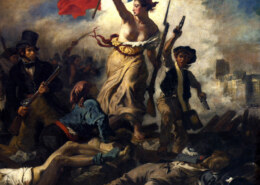The French Revolution was a global phenomenon that had a significant impact on people throughout Europe and the world in addition to the French people. Describe.
Reign Of Terror and The French Revolution: The Reign of Terror was a period of one year which extended from 1793 to 1794. Revolutionary Wars began during 1792. Many political clubs came into existence and one among those was the Jacobin club. It's members belonged mainly to the less prRead more
Reign Of Terror and The French Revolution:
The Reign of Terror was a period of one year which extended from 1793 to 1794.
Revolutionary Wars began during 1792. Many political clubs came into existence and one among those was the Jacobin club. It’s members belonged mainly to the less prosperous sections of society. Their leader was Maximilian Robespierre.
The Jacobins, on successful implementation of their planned insurrection, imprisoned the royal family, abolished Monarchy and declared France a Republic. Later, following the death of Louis XVI, Robespierre followed a policy of severe control and punishment.
The people who he considered as Enemies of the Republic – Ex nobles and clergy, members of other and his own political parties, who did not agree with his methods – were arrested, imprisoned and tried by a revolutionary tribunal. If the court found them guilty, they were guillotined.
( The Guillotine was a beheading device.)
Changes under the Robespierre Government:
- Meat and bread were rationed
- Peasants were forced to sell their grains at fixed prices
- All citizens were required to eat the equality bread
- All French men and women were Citoyen and Citoyenne
- Churches were converted into barracks or offices.
The fall of the Jacobin government gave an opportunity to the wealthier middle classes to seize power. A directory was appointed to safeguard against the concentration of power under one man. All this political instability paved the way for the rise of the military dictator, Napoleon Bonaparte.
See less

The French revolution of 1789, was one of the most crucial events that shook not only French society and Europe but the entire world. The French revolution is the most dramatic and complex event that was rooted in the social and political conditions of France of the 18th century and the ideas prevaiRead more
The French revolution of 1789, was one of the most crucial events that shook not only French society and Europe but the entire world. The French revolution is the most dramatic and complex event that was rooted in the social and political conditions of France of the 18th century and the ideas prevailing throughout Europe in the Age of Enlightenment. This revolution gave to the world the ideas of many great political philosophers whose ideas about democracy, republic, role of church, government and constitutionalism laid the foundation stone for the modern world’s polity, inspired art, culture and many revolutions across Europe and the world.
Influence Of French Revolution On France
1. Constitutional Monarchy: The king was reduced to a figurehead, the nobility deprived of titles and estates. Clergy, judges and magistrates were controlled by the state instead of the King. 2.Constitutionalism: The Revolution meant an end to arbitrary royal rule and held out the promise of rule by law under a constitutional order. Napoleon as emperor set up a constitutional system and the French Third Republic was launched with a deep commitment to upholding the ideals of the Revolution. 3.End of Feudal system: From the social point of view, the Revolution suppressed the feudal system, in the emancipation of the individual, in greater division of landed property, the abolition of the privileges of noble birth. 4.Economic sphere: Revolution had broken up large estates controlled by Church and Nobility, thus transforming rural France into land of small independent farms.
5. End of Domination by Catholic church: The domination of church was replaced by the concept of the French nation or people as a focus of common allegiance in a secular state. Church and state were separated and freedom of religion was established. 6. Idea of Nationalism: The revolutions gave birth to the concept of modern Nation-state and spirit of nationalism. It ingrained in the minds of people that France was not a kingdom of any King but a nation belonging to French people.
Influence Of French Revolution On Europe
1. Spread of ideas of Liberalism and Equality: The idea of giving people liberty and equality through a constitution was one of the important achievements of the revolution. And when Napoleon conquered Europe in the 1800s, constitutions were introduced into the states that came under French control. 2. Change is Mindset of people across Europe: Having experienced constitutional rule, people across Europe became liberals, even after the defeat of Napoleon and return of Monarchy after 1815. 3. Served as an source of ideals: The revolutionaries of the nineteenth century borrowed images as well as ideas from the French Revolution. a. The most famous of those images was that of ‘Liberty’. Liberty was portrayed as a young woman, Marianne,who appeared in countless revolutions of 1830’s. 4. Spread of Nationalism across Europe: Revolutionary wars under Napoleon played an instrumental role in the spread of nationalism in territories occupied by him and also created conditions necessary for unification of Italy and Germany. 5. Source of Inspiration: For liberals, nationalists and socialists in Europe who sought to bring about fundamental changes to the existing social and political order, 1789 was the inspiration.
Influence Of French Revolution On World
The French revolution contributed to the ideals of modernity- liberty, equality, fraternity etc to the world. Besides these all, it paved a way for new markets and trade through which globalization phenomena came into existence. Thus, the French had not only contributed to administrative reform but also helped in the growth of the modern economy, society and political structure. Most of the nations in modern times including India have adopted the ideas of these revolutions in their socio-economic and political system.
See less